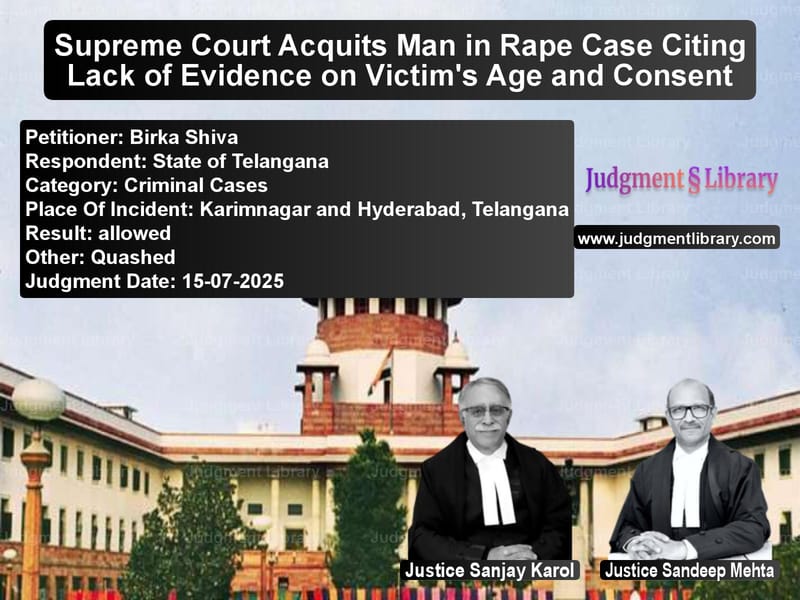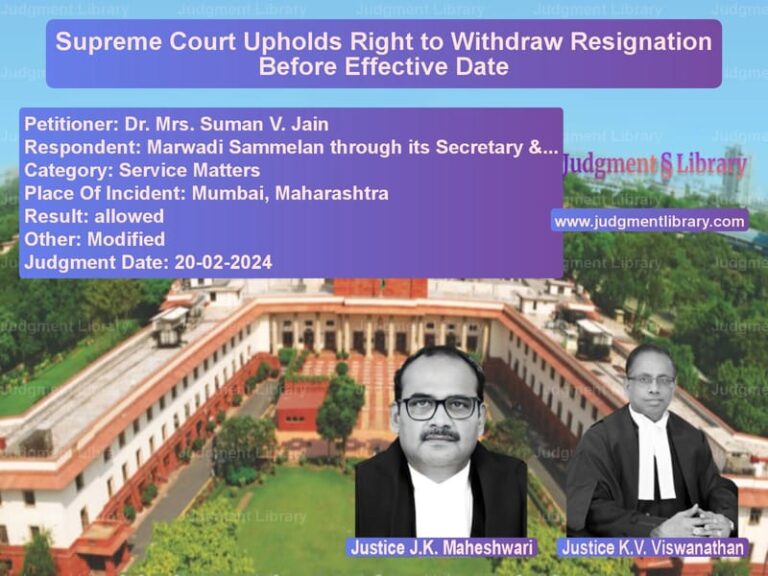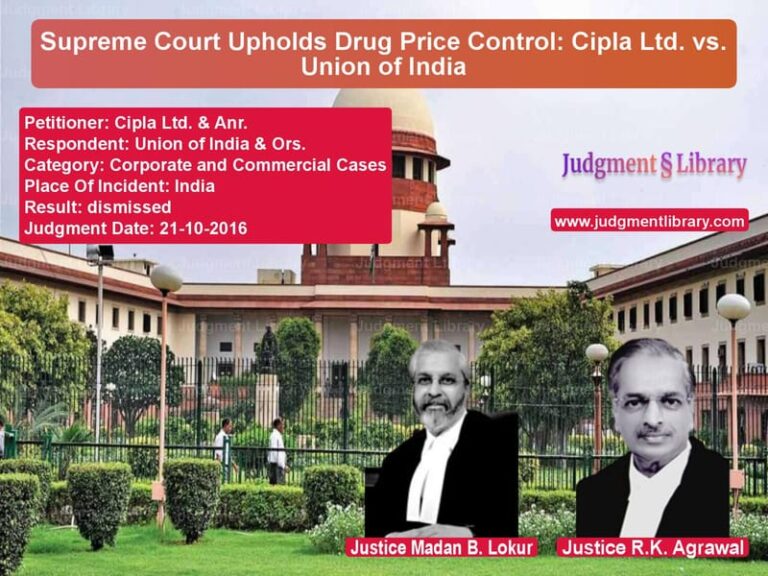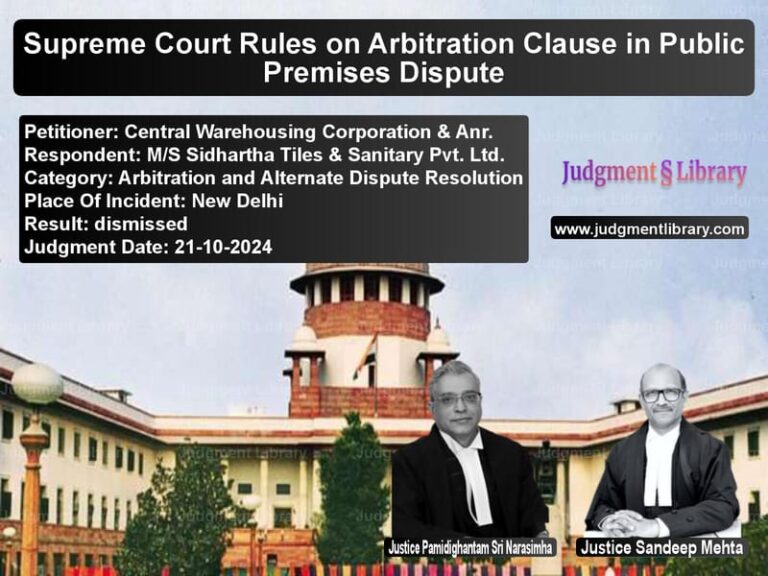Supreme Court Acquits Man in Rape Case Citing Lack of Evidence on Victim’s Age and Consent
In a significant criminal appeal that underscores the fundamental principles of evidence law and the burden of proof in criminal cases, the Supreme Court of India has acquitted a man convicted of rape, kidnapping, and wrongful confinement. The case of Birka Shiva versus the State of Telangana revolves around crucial questions about the age of the victim, the nature of consent, and the prosecution’s responsibility to prove guilt beyond reasonable doubt. The judgment delivered by Justice Sanjay Karol and Justice Sandeep Mehta highlights the importance of proper evidence collection and the dangers of convictions based on insufficient proof.
The case dates back to August 2012 when a young woman went missing from her home in Karimnagar, Telangana. According to the prosecution’s case, Birka Shiva, who was a friend of the victim’s brother and a regular visitor to their home, took the victim to Hyderabad on the morning of August 4, 2012. There, he allegedly tied a ‘pasupukommu’ (turmeric thread) around her neck, creating an impression of marriage, and confined her in a room at Shadnagar. The prosecution claimed that during this period of approximately two months, the appellant subjected her to sexual intercourse.
The case came to light when the victim’s mother filed a missing complaint on August 8, 2012, after her daughter became untraceable. Based on this complaint, police registered FIR No. 85 of 2012 under Section 366(A) of the Indian Penal Code. The situation took a turn when the appellant met with a motorcycle accident on October 12, 2012, and was hospitalized. It was at this time that the victim returned to her mother and narrated her ordeal, leading to additional charges under Sections 342, 376, and 366 of IPC being added to the case.
The Legal Journey Through Lower Courts
The Trial Court, after examining 13 prosecution witnesses and documentary evidence, convicted Birka Shiva under Sections 363 (kidnapping), 342 (wrongful confinement), and 376 (rape) of IPC. However, the court acquitted him of charges under Sections 366 or 366(A) IPC, noting that the aspect of forced marriage or seduction was not established. The Trial Court sentenced him to 5 years for kidnapping, 7 years of rigorous imprisonment for rape, and 6 months for wrongful confinement.
When the appellant approached the High Court of Telangana at Hyderabad, the court confirmed his conviction but significantly reduced his sentence. The High Court modified the punishment to 1 year for kidnapping, 2 years of rigorous imprisonment for rape, and maintained the 6-month sentence for wrongful confinement. The High Court, in its judgment, noted: “P.W.3 in his cross-examination has categorically admitted that she did not state to police that the accused forcibly kidnapped her and her evidence does not reveal that the accused used any force on her for having sexual intercourse. However, since she was aged below 16 years in view of the definition of rape under Section 375 of IPC having sexual intercourse with a woman aged below 16 years with or without her consent amounts to rape.”
The High Court further observed: “It is now well established that if the Court is satisfied from the evidence of the victim, a conviction can be solely based on such evidence without looking for further corroboration. Same can be done because the prosecutrix is no more treated as an accomplice in the crime. An accused cannot cling to a fossil formulae and insist on corroborative evidence, even if taken as a whole, the case spoken to by the victim strikes a judicial mind as probable. Judicial response to human rights cannot be blunted by legal jugglery.”
The Supreme Court’s Critical Analysis
Still aggrieved, Birka Shiva approached the Supreme Court, pleading his innocence and challenging both his conviction and sentence. The Supreme Court identified four key issues for consideration: whether the victim was a minor at the time of the incident; whether the appellant kidnapped her from lawful guardianship; whether he wrongfully confined her; and whether he committed rape.
The Court’s analysis began with the crucial question of the victim’s age. The prosecution had relied primarily on Ex.P11, a birth certificate issued by Zilla Parishad High School, which showed the victim’s date of birth as November 3, 1996. If accepted, this would make her approximately 15 years and 9 months old at the time of the incident in August 2012.
However, the Supreme Court delved deep into the evidentiary value of this document. The Court noted: “The evidentiary value of such an entry made in public or official registers may be admissible in evidence under Section 35 of the Indian Evidence Act, 1872. However, admissibility is distinct from probative value. While such documents may be admitted into evidence, their evidentiary weight depends on proof of their authenticity and the source of the underlying information. Mere production and marking of a document as exhibited by the Court does not amount to proof of its contents. Its execution has to be proved by leading substantive evidence, that is, by the ‘evidence of those persons who can vouchsafe for the truth of the facts in issue’.”
The Court extensively referred to its previous judgments on this matter. Quoting from Birad Mal Singhvi v. Anand Purohit, the Court emphasized: “The date of birth mentioned in the scholar’s register has no evidentiary value unless the person who made the entry or who gave the date of birth is examined. The entry contained in the admission form or the scholar’s register must be shown to be made on the basis of information given by the parents or a person having special knowledge about the date of birth of the person concerned.”
In the present case, the Court found significant flaws in how the prosecution proved the victim’s age. PW-13, the Headmaster of Zilla Parishad High School, admitted in his cross-examination: “I did not have personal knowledge as to what record was produced by parents of P.W. 3 as basis to enter her date of birth in our school as I was not Head Master in 2007. I cannot say in which school P.W.3 studied up to 5th Class. I do not have personal knowledge whether the said date of birth of P.W.3 was correct or not and I am giving evidence only on the basis of record.”
The Court further noted that the prosecution failed to examine the person who made the entry in the Admission Register or produce records from the victim’s primary school. Most importantly, none of the victim’s family members – her mother and brothers – mentioned her specific age in their depositions. Even the victim remained silent about her particular date of birth during her testimony.
The Court made a significant observation about the investigation: “All three of the I.Os. are curiously silent on the aspect of age of the alleged rape victim. This, in itself, raises credible questions about the investigation since a charge of rape is involved in which the age of the victim is an essential factor.”
PW-12, the investigating officer, admitted in cross-examination: “I have not visited the said college. I did not examine her classmates to enquire as to how P.W.3 was going to college. I did not enquire as to the birth place of P.W.3. It is true every Grampanchayath will maintain births and deaths register. I did not verify whether the date of birth of P.W.3 was got registered in the Grampanchayath. I did not enquire as to where P.W.3 completed her primary education.”
Based on this analysis, the Supreme Court concluded: “Well, suffice it to say that Courts of law cannot make a determination of guilt in thin air, based on estimations. In the present facts and circumstances, the proof submitted by the prosecution in the form of Ex.P11 (birth certificate issued by the school) was not sufficient to arrive at a finding that the prosecutrix was less than sixteen/eighteen years of age, especially when such a document was not sufficiently corroborated. Therefore, it was neither safe nor fair to convict the appellant based on it, particularly in the context where the age of the victim was such a pivotal factor.”
Analysis of Kidnapping and Wrongful Confinement Charges
The Court then examined the charges of kidnapping and wrongful confinement. For kidnapping from lawful guardianship under Section 363 IPC, the essential ingredients include taking or enticing a minor from lawful guardianship without consent. For wrongful confinement under Section 342 IPC, it must be established that the accused voluntarily obstructed the victim from proceeding beyond certain limits.
The Court noted that the evidence indicated the appellant was a regular visitor to the victim’s house as a friend of her brother. The victim’s own deposition revealed that she voluntarily accompanied the appellant on a motorcycle on August 4, 2012. The Court observed: “The victim’s own deposition does not demonstrate that the appellant forcibly removed or enticed her from the guardianship of her parents with deceit or inducement. She admits to having voluntarily accompanied the appellant on a motorbike on the morning of 4th August 2012 and having resided with him for nearly two months.”
Regarding wrongful confinement, the Court found no evidence that the victim was physically restrained or her movements restricted. The victim admitted that the appellant left daily for work and she remained alone at the residence. The Court noted: “What is absent from the record is any assertion that she was physically restrained, or her movements were restricted. The victim admits that the appellant left daily for work and that she remained alone at the residence. Finally, it is suggested that the appellant used to put a lock on the main door of the house. But this version appears to be just an afterthought and not correct. For, there is no indication that she attempted to flee, contact neighbours, or otherwise signal her unwillingness to stay in that house.”
The Court further noted the victim’s conduct: “These circumstances strongly suggest that the victim was not staying with the appellant against her own volition or will. We further find the narrative provided by her during the trial, to be improvised from her earlier statement recorded by the Police under Section 161 CrPC.”
The Critical Question of Consent in Rape Charges
The most significant part of the judgment deals with the charge of rape under Section 376 IPC. The Court reiterated the established legal principle: “It is trite law that a conviction for rape can be sustained solely on the testimony of the prosecutrix/victim, provided that her evidence inspires confidence in the mind of the Court and appears to be natural and truthful. However, if the version given by the prosecutrix is inconsistent, unsupported by any medical evidence, or the whole surrounding circumstances are highly improbable and believable in the case set up by the prosecutrix, the Court shall not act on the solitary evidence of the prosecutrix.”
In this case, the Court found that the victim’s testimony only mentioned the occurrence of sexual intercourse but did not indicate it was against her will. The Court emphasized: “The absence of consent is the sine qua non to sustain a charge under Section 376. That cannot, in our opinion, be met as per the evidence on record.”
The medical evidence from PW-8, a Civil Assistant Surgeon, indicated regular sexual intercourse but gave no definite statement about recent occurrence. The Court also noted that the couple resided together peacefully for two months without any indication of the victim’s discomfort or desire to leave.
The Supreme Court’s Final Ruling
After a comprehensive analysis of all evidence, the Supreme Court concluded: “The responsibility of the prosecution is to prove the case beyond reasonable doubt, which, in our considered view, it has failed to do in the present case. It appears that the entire prosecution story has been concocted for reasons best known to the prosecution. Under the present facts and on the weight of the evidence placed before the Trial Court, we are of the considered opinion that no definite conclusion could be drawn about the age of the victim. The prosecution, therefore, has not successfully proved that the victim was less than sixteen/eighteen years of age at the time of the alleged commission of crime, and thus, the benefit ought to have been given to the appellant.”
The Court further stated: “Secondly, as to the factum of kidnapping, wrongful confinement and rape, we are convinced that no such offence is made out as it does not meet the essential ingredients as defined in Sections 342, 363 and 376 IPC. We do not find any evidence which may suggest that the appellant kidnapped the victim from lawful guardianship or confined her, for approximately two months, against her volition in a house at Hyderabad or had sexual intercourse with the victim against her will or without her consent.”
Consequently, the Supreme Court set aside the conviction of Birka Shiva under Sections 376, 363, and 342 IPC and acquitted him of all charges. The Court also set aside the impugned judgment of the High Court and allowed the appeal.
This judgment serves as an important reminder of the fundamental principles of criminal jurisprudence – the presumption of innocence, the burden of proof on the prosecution, and the standard of proof beyond reasonable doubt. It highlights the necessity of proper investigation and evidence collection, particularly in cases where the age of the victim is a crucial factor. The Supreme Court’s meticulous examination of the evidence and its insistence on proper legal standards ensures that convictions are based on solid evidence rather than assumptions or incomplete investigations.
Petitioner Name: Birka Shiva.Respondent Name: State of Telangana.Judgment By: Justice Sanjay Karol, Justice Sandeep Mehta.Place Of Incident: Karimnagar and Hyderabad, Telangana.Judgment Date: 15-07-2025.Result: allowed.
Don’t miss out on the full details! Download the complete judgment in PDF format below and gain valuable insights instantly!
Download Judgment: birka-shiva-vs-state-of-telangana-supreme-court-of-india-judgment-dated-15-07-2025.pdf
Directly Download Judgment: Directly download this Judgment
See all petitions in Rape Cases
See all petitions in Bail and Anticipatory Bail
See all petitions in Fraud and Forgery
See all petitions in Extortion and Blackmail
See all petitions in Theft and Robbery Cases
See all petitions in Judgment by Sanjay Karol
See all petitions in Judgment by Sandeep Mehta
See all petitions in allowed
See all petitions in Quashed
See all petitions in supreme court of India judgments July 2025
See all petitions in 2025 judgments
See all posts in Criminal Cases Category
See all allowed petitions in Criminal Cases Category
See all Dismissed petitions in Criminal Cases Category
See all partially allowed petitions in Criminal Cases Category







